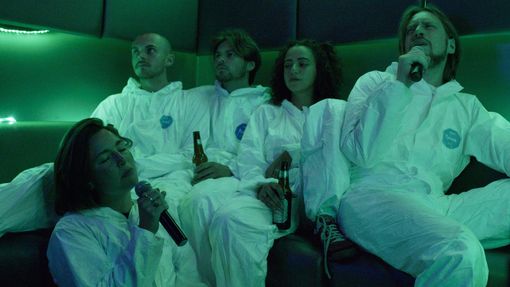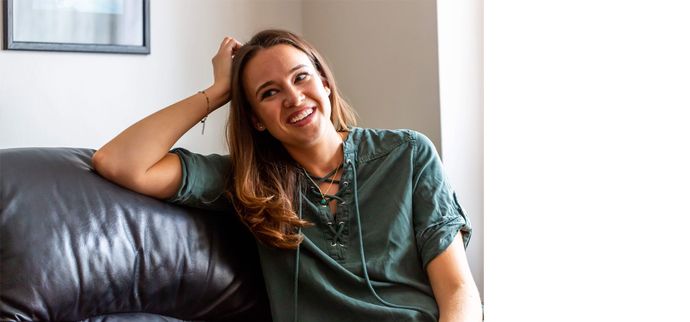
Lucy Descourtier, a graduate of MA/MFA Advanced Theatre Practice, reflects on her experience studying on the course. She speaks about the opportunities it provided her to experiment and learn from industry experts, while also being challenged and pushed outside of her comfort zone. Lucy also talks about her current work as a freelance Director and her theatre company ANTS, which she co-founded while studying at Central.
What made you apply to the Advanced Theatre Practice course?
I needed a space to feel free (and supported) to try and to fail. It was one of the most important things to me, not just to learn from great practitioners, but to be pushed and challenged and open myself to all things new. I spoke to someone who’d done the course before me and asked: how much opportunity will I get to be practical? Her reply convinced me it was the right course: you’ll do so much practical work you’ll be exhausted.
What was your creative background prior to applying?
I worked as a freelance producer, having worked in outreach and education, and fundraising and events departments before that. I was worried to begin with that I would be behind everyone else, with many having completed undergrads in theatre, but the teaching staff reassured me that commitment to learning was key. I remember in my interview being asked by Lynne Kendrick what I meant by ‘experimental’. My reply was that ‘you could see that it was made with love’. I felt so silly in the moment - it wasn’t at all an ‘intellectual response’, but Lynne just looked at me and smiled, and told me about a critic who studied the theatre of love. Straight away she understood my meaning, and redirected it to engage with critical thinking. I think, in many ways, this course is taught with love.
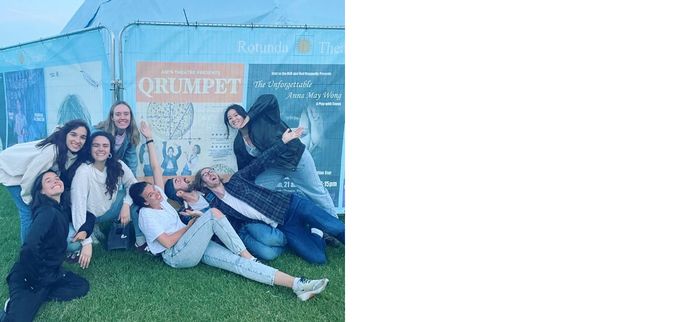
Can you give us an overview of your time on the course from start to finish, covering the projects and modules you worked on?
Oof big question. There are quite a few modules along the way!
In first term, we had quite a few introductory modules: we had Interdisciplinary Practices, which is split into 3; Composition, Scenography and Performance. Keen to pursue directing, I chose Composition, which focusses on strategies to direct and compose theatre. Each week, we would have a new practitioner lead a workshop, in which we’d learn new techniques, before creating a small piece of work in response ourselves. This was definitely the most practical module in term one. Outside of Composition, I had a Cultural Landscapes module, where we joined up with other MA groups to learn about the cultural landscape of the arts industry in the UK, as well as putting together funding bids and learning about the practicalities of making theatre work in our industry. Finally, we had Practitioners’ Study. This was with the full Advanced Theatre Practice cohort, and each week a practitioner would join us and share their work-in-progress with us. Each session would be different - one week we’d be learning dance routines, and the next we’d be making immersive art installations - and we’d be encouraged to keep a diary of our learnings along the way.
In second term, our focus narrowed slightly, and we had modules called Practice as Research and Practices. Practice as Research was an entirely new concept to me, and meant using your practice to conduct research (kind of does what it says on the tin). In our chosen group, we decided to look at how it was that audiences empathised with puppets, and conducted multiple workshops in which we learnt to build and puppeteer puppets, and interacted with audiences to analyse their responses to the puppet and its journey. Next we turned to Phenomenology - a form of philosophy - to unravel our findings. Practices felt a lot less ‘new’ to me, as it was almost an extension of term one’s Interdisciplinary Practices. The course leaders put each of us into groups of 7, (I don’t know how they decided on the groups but they chose well!), and we had the term to create a new piece of work. A lot of this was self-led - learning how to collaborate effectively as a team and ensure that the work comes before ego - but we had lots of workshops run by facilitators and practitioners who helped us to understand different approaches to theatre making, and to work out which would be most useful to us as a company. The success of our group was that I would never have made a show like this if I were in any other circumstances - it was borne entirely of all of our weird and wonderful brains, and taught me more then I could ever have imagined.
In our final term, we had one mega project - the Sustained Independent Project (SIP). This time, we could choose our groups and would create a full-length piece of theatre together. I stayed in the same group, having worked well together in the Practices module, and once again, we made a show that wouldn’t have been possible without all of our creative brains collaborating together. We saw this as an opportunity to make a show, not for university, but for the public, and went on to tour the show for the next two years, gaining rave reviews and a whole load of new experience! Outside of our SIP, we each chose an elective. I chose Directing Text which helped me to understand how my skills and experience in theatre-making transferred to the more conventional practice of directing.
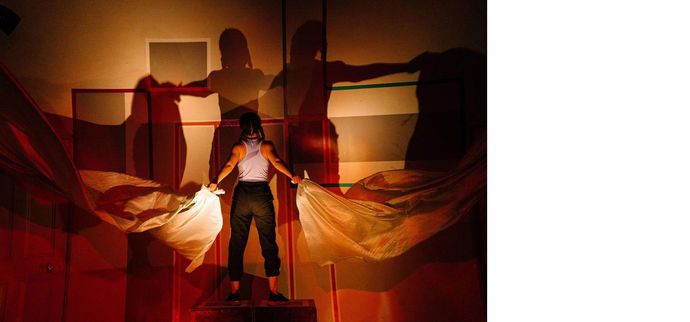
How did the course develop your practice?
I think the biggest thing that anyone will learn on this course is how to put the work first and work as a unit. Establishing a good rapport and welcoming input, contribution and spanners in the work is, in my opinion, key. Through the many collaborations on the course, and through my own experience since, I’ve come to understand how much people are key to my practice. As much as I may have my own vision, the most beautiful work comes from when my vision is disrupted and distorted and rerouted. I love a simple moment of misplaced laughter in reciting text, and feel alive at the many new possibilities that may come from it. It’s a relatively fresh way of working in the industry, and I love the freedom and energy that it brings to work. I also think that the course allowed me to hone my sensibilities; working with people from so many different practices and backgrounds, I was able to grow what I believed was ‘theatre’, and learn so much more nuance that exists within our artform.
How did the visiting lecturers/practitioners and academics help?
Visiting lecturers, practitioners and academics enjoyed bringing their practice into the shared space and their enthusiasm and generosity brought countless moments of wisdom.
What was the most memorable aspect of the course?
Being given the supportive space to create - it was liberating! Just knowing that you’d walk into a room with no idea what might happen, and then deciding you want to play with some strobe lights, and then lying on the floor because you can’t, in fact, handle strobe lights, and then out from strobe lights comes the discovery of man-made manipulated stage lighting, operated by a static bicycle. Those were the moments of pure joy and enlightenment.
What do you think makes a good theatre practice student?
Someone who is open and willing to try something new. If you think you know exactly what you want to do, and exactly how you are going to do it, then this course may not be for you. If you’re ready to embrace different attitudes, cultures and styles, and are excited to go out of your comfort zone and just see what happens, then you will thrive and grow. It really is a place for experimentation.
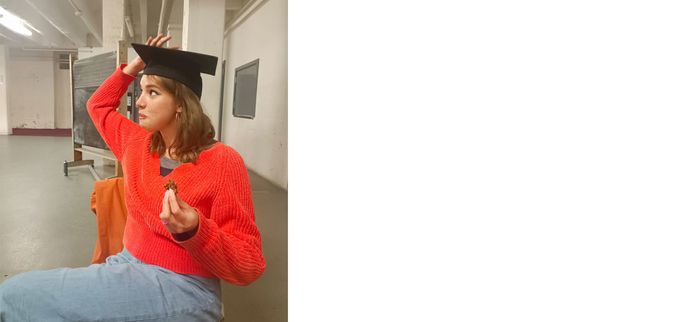
What have you been up to since graduating?
Since graduating I’ve continued working with my company, ANTS Theatre, which was established during my time on the course. We’ve been making and touring shows ever since, but have taken a slower approach this year to support the journeys our lives are taking, (I’m having my first baby in June eep!). Alongside my work with ANTS, I’m directing shows as a freelance director, with fringe festivals and UK tours under my belt, and hopefully soon some international touring too!
What’s next for you?
Changing the world! My work with ANTS has taken an activist turn and we’ve started R&D on a new show called The Movement. Meanwhile, negotiating work as a new mother has made me more determined than ever to implement inclusive practices. I’ll also be co-directing a piece with the fabulous University of Oxford professor, Marcus du Sautoy, who was a mentor on the MFA course, and an all-round creative genius. The piece is called The Axiom of Choice and is due to run for three weeks in London in the winter!
Follow Lucy on Instagram @lulalizard, and visit ANTS Theatre Company’s website to find out more about her and her work.

